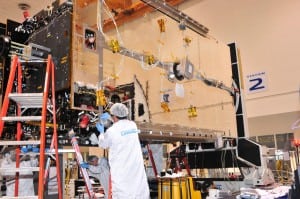Latest News

SSL workers assemble the ABS-2 satellite at the SS/L manufacturing facility in Palo Alto, Calif. Ex-Im Bank approved $461 million of credit to finance the export of three American-made satellites to Hong Kong. Photo: SSL
[Via Satellite 08-18-2014] In less than two months the United States Congress must make a decision on the fate of the Export-Import Bank, an independent federal agency designed to provide export financing when private banks are not able. The satellite industry around the world stands out as the quickest-growing market the bank supports, which makes this decision pivotal for satellite as a whole. In one of her last interviews as president of the Satellite Industry Association (SIA), Patricia Cooper spoke to Via Satellite about the importance of the Ex-Im bank for the industry.
“We call it an increasingly critical element in U.S. companies winning satellite business, particularly given that there is such an increase in brand new satellite operators. More than 12 new countries in the last five years have become satellite operators, so while export credit financing may be helpful for traditional or fleet-based operators, there are a lot of new entrants to the business, and it’s a high upfront and fixed cost business. Securing the credit for such a costly up front project is a significant factor,” said Cooper.
Credit financing is one of many factors satellite operators consider when making a purchase. Without the Ex-Im bank, U.S. manufacturers would have to do their best to offer comparable terms to foreign competitors that have government-supported export credit agencies. According to the SIA’s “State of the Satellite Industry Report,” approximately 68 percent of the $15.7 billion global satellite manufacturing revenues in 2013 came from U.S. companies. Without the bank, satellite operator decision-making on new purchases is likely to change.
“The concern is it would distort decision making for buyers. They would no longer be looking at an even playing field where manufacturers from all of the global providers would have comparable [financing] packages. Instead they would be looking at financing as one of the lead items rather than one of the many factors they might consider,” said Cooper.
The Ex-Im bank has supported numerous satellite projects for SSL, Boeing, Lockheed Martin, Orbital Sciences and others. SpaceX too has received considerable support, including a 105.4 million loan to launch the Amos 6 satellite for Israeli satellite operator Spacecom. Without the bank, more deals may go to other foreign manufacturers and launch providers in the future.
“The bank is very important to Boeing, mostly for commercial airplane sales but also for satellite sales,report global or just within the U.S.?ext but I want to check with you that this is correct. is book.then see the headlines, I d” said Boeing spokesperson Tim Neale. “It is a significant competitive issue for us. Some 60 countries have export credit agencies, including all of the countries with aerospace industries. Airbus has the support of three export credit agencies (in France, Germany and the United Kingdom). Customers have been telling us for months that they are concerned about the future of the U.S. Export-Import Bank.”
Neale described the Ex-Im bank as a “critical competitive need.” Russia’s Export Insurance Agency of Russia (EXIAR) and France’s French Insurance Company for Foreign Trade (COFACE for its name in French) both support satellite projects in their respective economies. The decision to reauthorize the bank, should Congress do so, is seen as a move that would maintain a more level playing field for U.S. companies.
“The concern is that international buyers, particularly [with] private financing on their own, would either not be able to buy satellites or they’d be directed by the absence of credit financing in the U.S. to buy non-U.S. spacecraft,” said Cooper.
On July 15, governors from 31 states sent a signed letter to John Boehner, R-Ohio, Harry Reid, D-Nev., Nancy Pelosi, D-Calif., and Mitch McConnell, R-Ky., urging them to prevent the bank’s charter from expiring this year. Congress is currently on summer recess, pushing the decision even closer to the edge. Without authorization, the 80-year old bank’s charter will expire on Sept. 30.
Get the latest Via Satellite news!
Subscribe Now